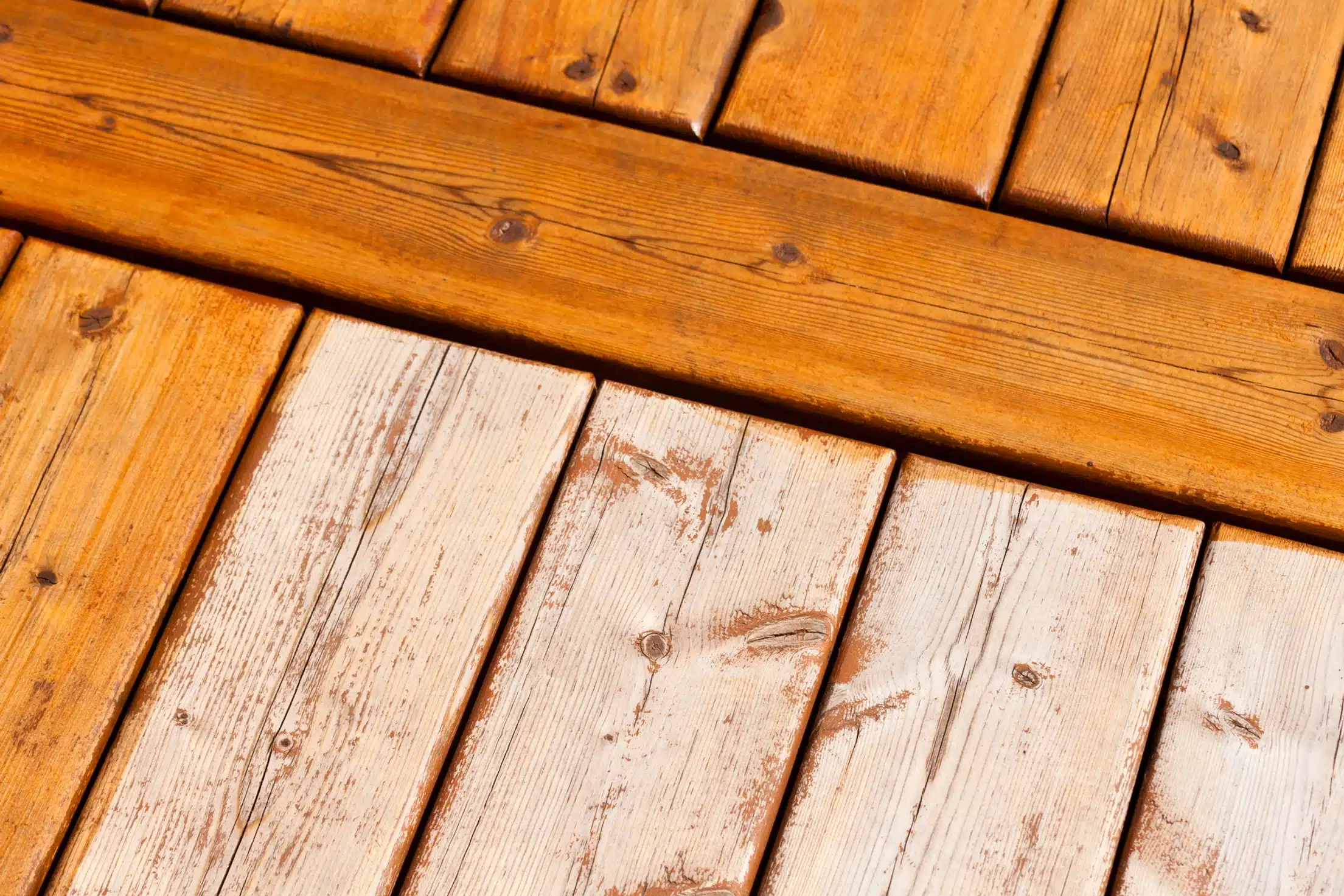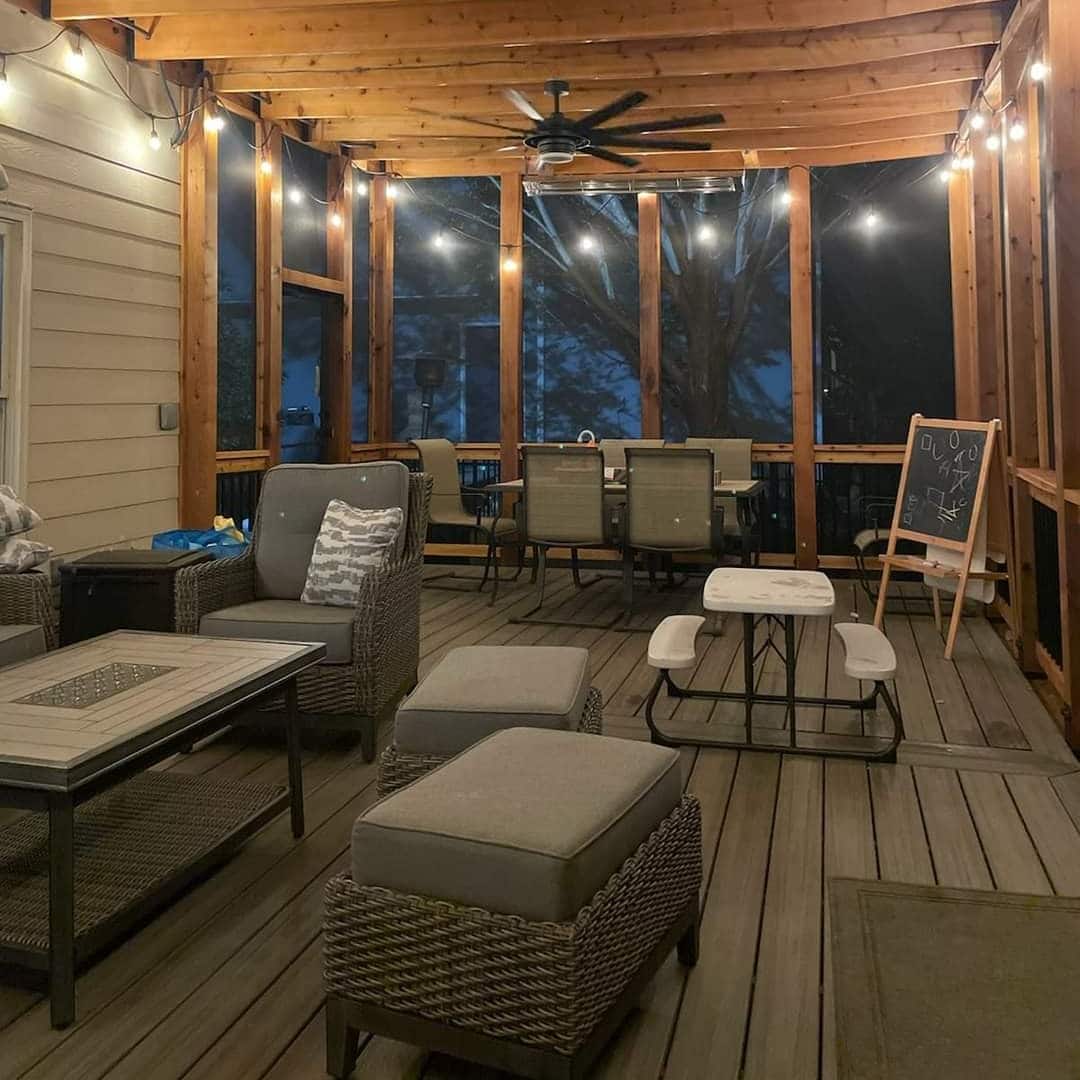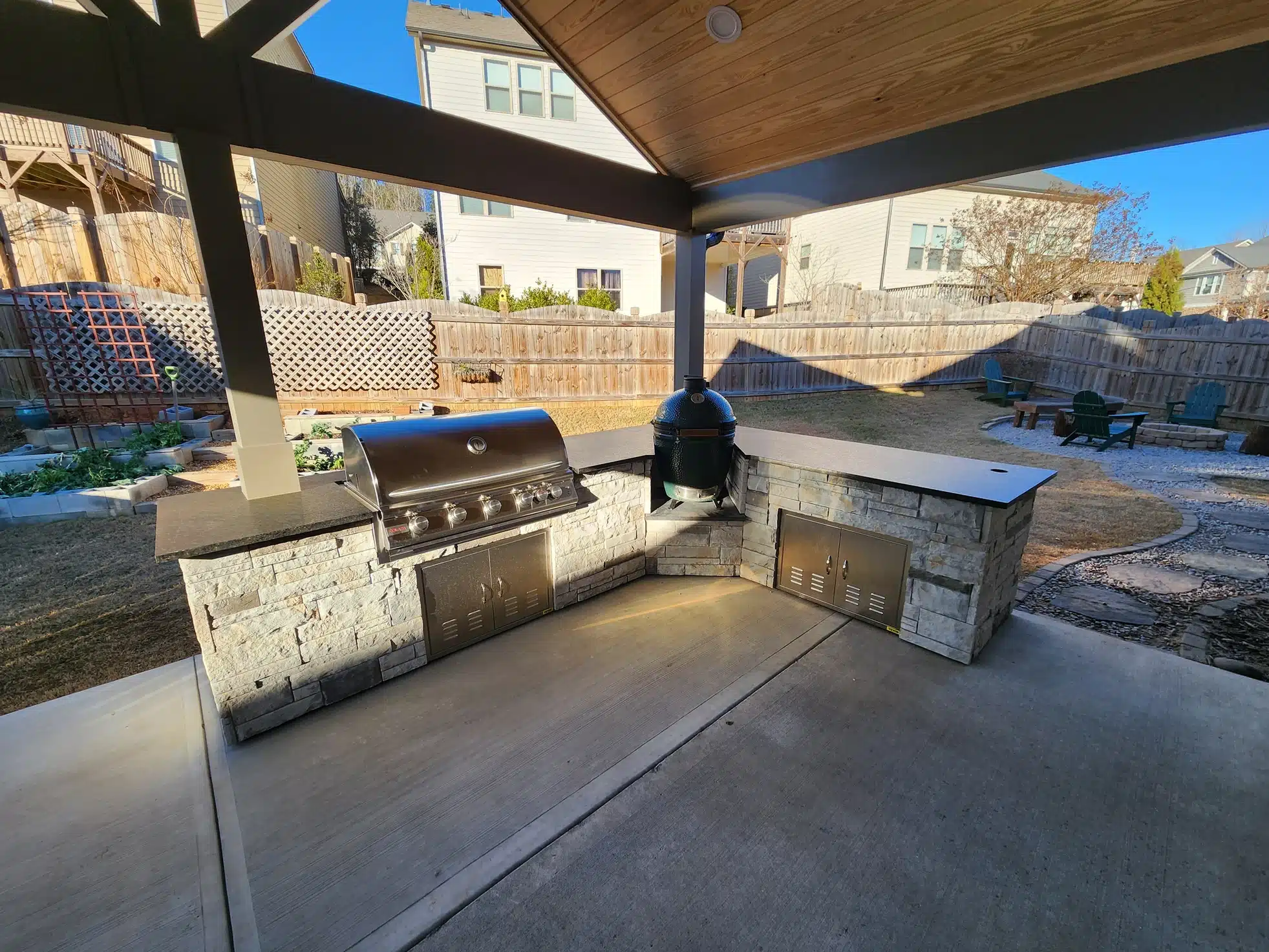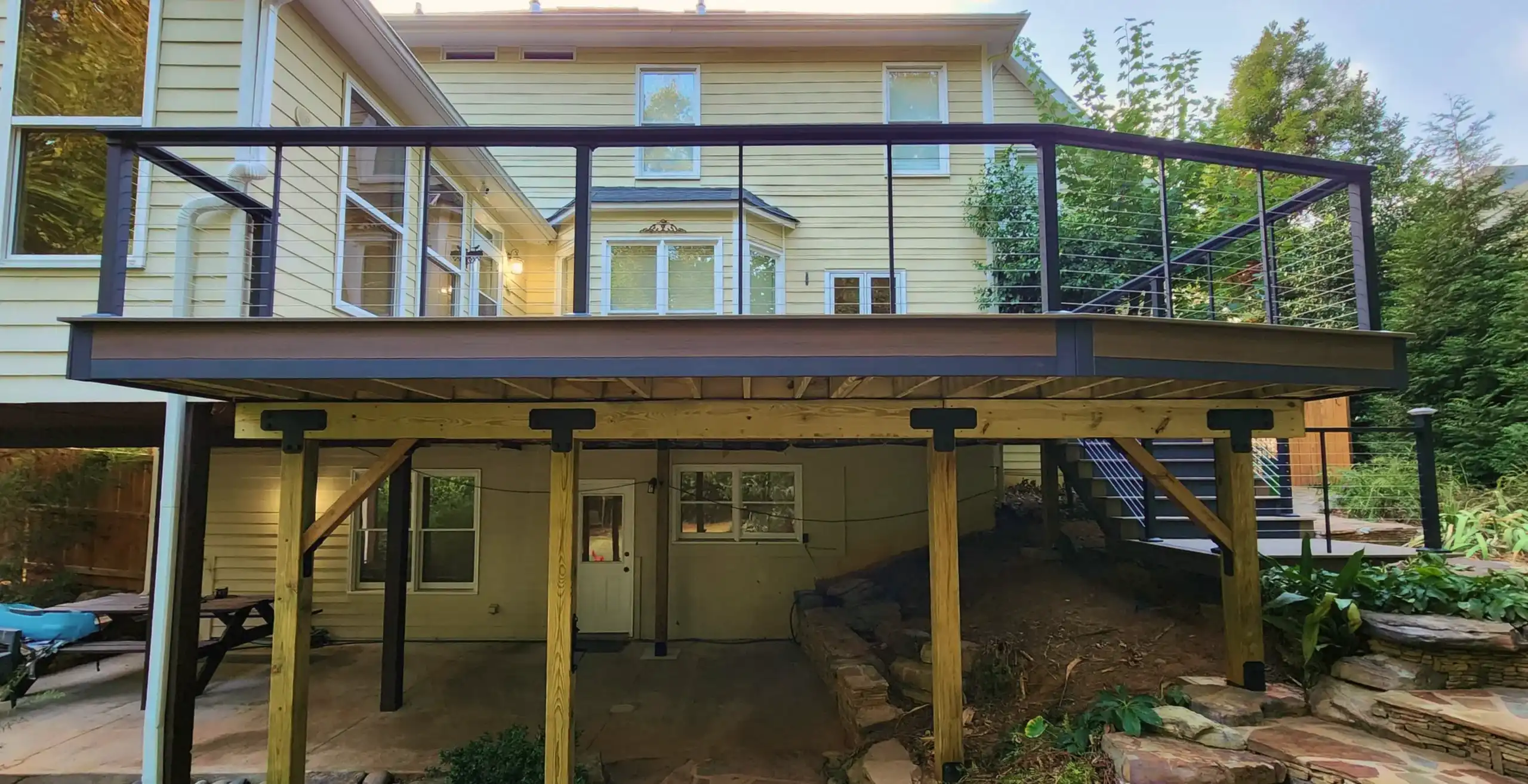Selecting the perfect decking material is more than just a matter of aesthetics; it’s about finding the right balance between maintenance, longevity, and the visual appeal of your outdoor living space.
Making a decision between a composite vs wood deck is as simple as narrowing down the factors that matter most to your family and building a deck to suit those needs.
This comprehensive guide aims to illuminate the key differences between composite and wood decks, helping you make an informed deck material choice that complements your lifestyle, budget, and design preferences.

Whether you’re looking for durability, low maintenance, or environmental sustainability, understanding these materials’ nuances is crucial in creating a deck that embodies your values and meets your expectations.
Exploring Composite Decking
What are Composite Decks? What are they made of?
Composite decking is a modern marvel, blending recycled wood fibers with plastics to create a material that captures the natural beauty of wood while significantly reducing its maintenance needs.
This innovative combination results in a durable, eco-friendly alternative to traditional wood decking, offering homeowners the best of both worlds.
It’s often made from recycled plastic and features a realistic grain pattern similar to natural wood. Unlike wood, composite deck boards are manufactured to be straight and flat, free from the warping that often characterizes their wood deck counterparts.
Composite decking can present unique challenges as a deck material, however, and it’s important to understand what you can expect when you build a composite deck.
Advantages of Composite Decks
The allure of wood plastic composite decking lies in its numerous benefits.
-
Its durability is unmatched – it’s resistant to fading, staining, scratching, and mold, ensuring improved durability and a pristine look for years to come with minimal upkeep.
-
Composite deck boards are remarkably low maintenance; forget about the annual sanding, staining, or sealing—simple soap and water are all that’s needed to maintain its appearance.
-
The sustainability factor of composite deck materials is a major draw for eco-conscious individuals, as it often incorporates recycled materials, contributing to waste reduction and forest conservation.
Disadvantages of Composite Decks
However, composite decking is not without its drawbacks. The initial investment is typically higher than wood decking, though it’s important to consider the long-term savings on maintenance and replacement costs.
Composite materials also tend to retain more heat than wood products, potentially making the deck surface uncomfortable in direct sunlight.
If where you live tends to get a lot of direct sunlight there are decking options that have new technologies to reduce this, and you can incorporate innovative shading solutions or select lighter colors to help mitigate this issue.
Real-World Example
One of our success stories that exemplifies the advantages of composite decking involved a family from suburban Atlanta who opted for composite over wood for their backyard retreat.
Their decision was based on the desire for a solution requiring as little maintenance as possible. They chose composite boards over a wooden deck so they had an outdoor space that could withstand the humid Georgia climate without sacrificing beauty.
After a year, the family is still unbelievably happy with their choice, telling us that the composite deck looks as great as the day it was built, even with minimal upkeep.
The Beauty of Wood Decks
Wood decking offers a timeless appeal that composite materials strive to emulate. The natural grains, textures, and colors of wood provide a warmth and authenticity to outdoor spaces that is uniquely its own.
We build decks with a variety of wood species. For homeowners looking for real wood, it’s possible to utilize everything from domestic woods like pressure treated pine to more premium and exotic options like ipe, garapa or tigerwood.

Types & Characteristics of Wood Decks
Pressure-Treated Lumber
Affordable and widely available, treated with chemicals to resist rot and pests. Ideal for budget-conscious homeowners who value durability. Pressure-treated wood can stand up to the elements and last a long time, as long as you’re committed to proper maintenance.
Cedar and Redwood
Valued for their natural beauty and resistance to decay and pests. These softwoods require more maintenance but offer a middle-ground option in terms of price and longevity.
Exotic Hardwood
Including ipe and teak, known for their extreme durability and resistance to environmental factors. They represent a premium option, offering a luxurious appearance with a higher price tag per square foot.

Advantages of Wood Decks
Homeowners love wood decking because of its unparalleled natural beauty and the ability to customize its appearance through staining or painting. Each board is unique, offering a variety of grain patterns and color variations that add character to any outdoor space.
Disadvantages of Wood Decks
The main drawbacks include the need for regular maintenance, such as staining and sealing, to preserve its appearance and structural integrity. Wood can be susceptible to weathering, rot, and insect damage if not properly maintained.
If you’re worried about insect damage from pests like carpenter bees, ants, and other insects local to us here in the metro Atlanta, Georgia area, real wood can present a challenge, as its natural fibers just look like a delicious meal to these critters.
What Our Customers Say About Wood Decks
“We chose cedar for our deck because we wanted the natural look and feel that only real wood can provide. Yes, it requires a bit more care, but the beauty it adds to our home is worth it.
Each year, as we re-stain the deck, it feels like renewing a piece of art that we get to live with every day.”
– Emily R., homeowner
Composite vs. Wood Decking: Which One Is Right for Your Family?
When comparing composite and wood decking, several factors come into play: durability, maintenance, cost, aesthetics, environmental impact, and local considerations.
-
Durability and Maintenance: Composite decking excels in durability, requiring minimal upkeep, while wood decking offers a natural look but needs regular maintenance to combat wear and tear.
-
Cost Analysis: Initially, composite decking is more expensive, but lower maintenance costs make it a cost-effective option in the long run. Wood decking has a lower upfront cost but requires ongoing maintenance, potentially leading to higher costs over time.
-
Aesthetics and Design: Composite decking offers a wide range of colors and textures, while wood decking provides a natural beauty that can be customized through stains and finishes.
-
Environmental Impact: Composite decking uses recycled materials, making it an eco-friendly option, whereas sustainably sourced wood is a renewable resource that can have a lower environmental footprint.
What Type of Deck Makes Sense Here in Atlanta?
Atlanta’s unique climate and architectural styles significantly influence the choice between composite and wood decking. As an Atlanta homeowner, you need to consider both practical and aesthetic factors to select the best material for your backyard deck.
Climate Considerations in Atlanta
Atlanta experiences a humid subtropical climate characterized by hot summers and mild winters, with substantial rainfall throughout the year. This environment can be challenging for outdoor decking materials:
Composite Decking: Its resistance to moisture, rot, and mold makes composite decking an excellent choice for Atlanta’s humid conditions. Composite materials withstand the elements better than wood, requiring less maintenance and offering longer-lasting appeal without the warping or fading that can occur in such a climate.
If reducing annual maintenance costs are a priority and aren’t scared off by potentially higher composite costs, it might be a great fit.
Wood Decking: While wood decking provides a natural and traditional look that many homeowners desire, it requires more upkeep in humid climates to prevent decay and damage from moisture. Woods like cedar and redwood, known for their natural resistance to moisture and insects, can be suitable choices. However, they demand regular maintenance to preserve their beauty and integrity.
Local Style Preferences and Trends
Atlanta’s rich history and diverse architectural landscape—from classic Victorian homes to modern urban lofts—also play a crucial role in decking material selection:
Aesthetic and Architectural Harmony: Wood decking often appeals to those looking to maintain the historical integrity or natural aesthetic of their homes. Its authentic look and ability to be customized through stains and finishes enable homeowners to match the decking with their home’s architectural style.
Modern and Sustainable Choices: Composite decking, with its wide range of colors and textures, caters to homeowners seeking a more contemporary look or prioritizing sustainability. The material’s durability and low maintenance requirements make it a practical choice for busy homeowners or those looking to minimize their environmental impact.
In deciding on the best decking material for Atlanta homes, it’s essential to balance these climate considerations and style preferences. Whether you lean towards the timeless beauty of wood or the durable, low-maintenance appeal of composite materials, your choice should reflect both your lifestyle needs and the character of your home.
Kirchner Customs specializes in helping Atlanta homeowners navigate these considerations, ensuring their deck not only suits the local climate but also complements their home’s aesthetic and their personal style.
Choosing the right decking material involves weighing these factors against personal preferences and lifestyle needs. Whether the priority is durability, aesthetics, or environmental sustainability, there’s a decking solution to suit every homeowner’s vision for their outdoor space.
Expert Recommendations
When it comes to selecting the perfect decking material for your home, insights from industry experts and real-world projects can be invaluable. At Kirchner Customs, we’ve seen firsthand how the choice between composite and wood decking impacts the overall satisfaction and long-term enjoyment of outdoor spaces.
Here are some expert recommendations and tips from our Founder, Derek Kirchner, based on our years of custom deck building experience:
-
Consider Your Lifestyle: Derek says, “If your goal is to spend more time enjoying your deck rather than maintaining it, composite decking might be the right choice for you. Its durability and low maintenance requirements allow for more leisure time and less work.”
-
Evaluate Long-Term Costs: While wood decking may have a lower initial cost, the ongoing maintenance expenses can add up. Composite decking, on the other hand, requires less upkeep, potentially saving you money and effort in the long run.
-
Think About Aesthetics: If the natural look and feel of wood are important to you, then traditional wood decking offers a beauty that is hard to replicate. Remember, though, it requires regular maintenance to keep its appearance.
-
Safety and Comfort: Derek also pointed out, “If you’re planning to enjoy your deck with bare feet, make sure to consider the texture and heat of your decking material. Composite decking doesn’t splinter, which can make it a safer option for families with children.”
Conclusion
Choosing the right decking material is a significant decision that affects not only the aesthetic appeal of your outdoor space but also its functionality, maintenance requirements, and lifespan.
Both composite and wood decking have their advantages and disadvantages, and the best choice depends on your personal preferences, lifestyle, budget, and long-term goals. By considering the durability, maintenance, cost, aesthetics, environmental impact, and safety of each option, you can make an informed decision that aligns with your vision for your outdoor living space.
We encourage homeowners to reflect on what matters most to them in creating their ideal deck. Whether you prioritize the natural charm of wood or the durability and ease of maintenance of composite materials, your deck should be a reflection of your personal style and a space where you can make lasting memories.
Start Building Your Custom Deck Today
Ready to bring your dream deck to life? Kirchner Customs is here to help. With years of experience in custom decking solutions, we’re equipped to guide you through the selection process, ensuring that your new deck meets your aesthetic preferences, lifestyle needs, and budget.
Contact us today for a consultation and discover how we can transform your outdoor space into the perfect backdrop for relaxation and entertainment. Let’s create a deck that you’ll love for years to come.



